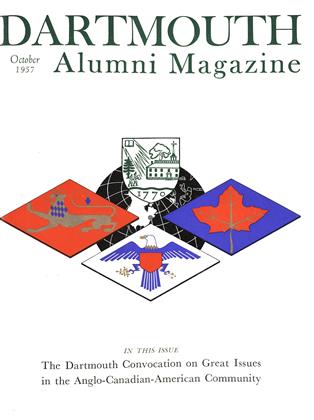IN a special dedication ceremony during the Anglo-Canadian-American convocation, the public affairs laboratory of the Great Issues Course, in Baker Library, was named the Charles Ransom Miller Public Affairs Laboratory in memory of the Dartmouth graduate of 1872 who became a famous editor of The NewYork Times.
Prof. James F. Cusick, director of theGreat Issues Course, presided at the briefprogram, and speakers were Arthur HaysSulzberger, LL.D. '51, publisher of TheTimes, and President Dickey.
To mark the dedication, a plaque wasmounted in the mantel above the fireplace in the laboratory. It reads:
CHARLES RANSOM MILLER PUBLIC AFFAIRS LABORATORY dedicated September 6, 1957 in memory of Charles Ransom Miller, 1849-1922, born in Hanover, New Hampshire, graduate of Dartmouth College in 1872 and awarded her honorary Doctorate of Laws in 1905, editor of The New York Times 1883-1922. Of him Adolph S. Ochs, publisher of The NewYork Times, said: "His scholarly attainment, his facility and lucidity of expression, broad vision, extraordinary knowledge of public affairs, having a statesman's conception of their proper conduct, and his lofty patriotism have made the editorial page of The NewYork Times consulted and respected throughout the world, and distinguished it as the foremost exponent of enlightened American public opinion."
In his brief dedicatory address, Mr. Sulzberger recalled the journalistic career of Charles Ransom Miller, first with TheSpringfield Republican and then with The New York Times, and praised the editor's deep and active concern with the freedom of the press in our democracy. "To read the words of Charles R. Miller on press freedom, spoken in 1915," he said, "is like reading a story from today's newspaper."
Mr. Sulzberger told how Mr. Miller was called before a Senate committee in 1915 because The Times at that time sup- ported the Allies and united action against aggression. "Another sort of ag- gression," Mr. Sulzberger said, "almost as terrifying to those who understood its implications was displayed in 1915, and again in 1955, by certain members of the United States Senate." The latter refer- ence was to the pressure exerted on TheTimes by die subcommittee headed by Senator Eastland of Mississippi, because of the paper's attacks on segregation in southern schools, the investigative methods of some congressional committees, Mc- Carthyism, and the restrictions of the McCarran Immigration Act.
"Thus we have history repeating itself forty years later," said Mr. Sulzberger, "and for the same reason: because a free newspaper chose to speak its mind freely. Here at Dartmouth, where liberal tradition is so deeply riveted, I do not have to point out that freedom of the press belongs to everyone and is not just a special privilege of the publisher. If we the people are to be strong and prevail, we must be well informed; we must have access to all the facts necessary for sound judgment. We must have freedom to read, to listen, to discuss. To this essential process of citizenship, Dartmouth's Great Issues Course is a notable contribution, and President Dikey's perception in organizing it cannot be too highly commended. I wish all colleges exposed their students as effectively to the forces, conflicts, and currents which for better or worse will shape our world in the decades ahead. The young men who pass through these doors will understand the important things of life and know where the struggle lies. They will know, as Charles R. Miller knew 42 years ago, that it is not only a foreign enemy who can assault the citadels of liberty."
In response to these remarks, President Dickey praised Mr. Sulzberger's stewardship of The Times which he called "one of the world's most basic educational resources." He added that the dedication of the public affairs laboratory was not merely a "nice" thing to do, but served as an act of educational significance. "All good education," Mr. Dickey said, "seeks to give to the great generalizations about human experience a relevance and a concreteness that makes them real for other men. Perhaps nothing does this better for a student than the example of a man who has walked the same path of study on the way to a distinguished career. Charles Ransom Miller performed this role for Dartmouth men, and nothing is more appropriate than that this unique laboratory should henceforth honor his name as an educational reminder to all Dartmouth students, whether they follow his career path or any other to distinction."
President Dickey expressed great regret that Hoyt Miller, who had assisted the College in planning the memorial to his father, was missing from the gathering because of his sudden death in August. "We may be sure," he concluded, "that what we have done here today is a happy culmination of Hoyt Miller's desire to create a meaningful memorial to his father here at Dartmouth."
Arthur Hays Sulzberger, LL.D. '51, delivering his dedicatory address. Seated behind him are Prof. James F. Cusick, director of the Great Issues Course, and President Dickey.
 View Full Issue
View Full Issue
More From This Issue
-
 Feature
FeatureFirst Panel Discussion
October 1957 By SIR GEOFFREY CROWTHER -
 Feature
FeatureOpening; Assembly
October 1957 By THE HONORABLE LEWIS W. DOUGLAS -
 Feature
FeatureFinal Assembly
October 1957 By THE HONORABLE JOHN GEORGE DIEFENBAKER -
 Feature
FeatureTHE DARTMOUTH CONVOCATION ON GREAT ISSUES IN THE . ANGLO – CANADIAN – AMERICAN COMMUNITY
October 1957 By GEORGE O'CONNELL -
 Feature
FeatureFirst Panel Discussion
October 1957 By CLARENCE B. RANDALL -
 Feature
FeatureHonorary Degree Ceremony
October 1957 By SIR WILLIAM HALEY
Features
-
 Feature
FeatureAn Impressive List of Honors
June 1961 -
 Feature
FeatureArtistry on Film ... ... With Serious Intent
OCTOBER 1963 -
 Cover Story
Cover Story1894 FACULTY REPORT ON COEDUCATION
MARCH | APRIL 2014 -
 Feature
FeatureA Valedictorian Changes His Mind
MAY 1972 By ALBERT WILLIAM LEVI '32 -
 Feature
FeatureSGT. BROWN'S RUGGED BOYS
May 1962 By CLIFF JORDAN '45 -
 Feature
FeatureThe Fated Morning
FEBRUARY 1964 By HAROLD F. BRAMAN '21

